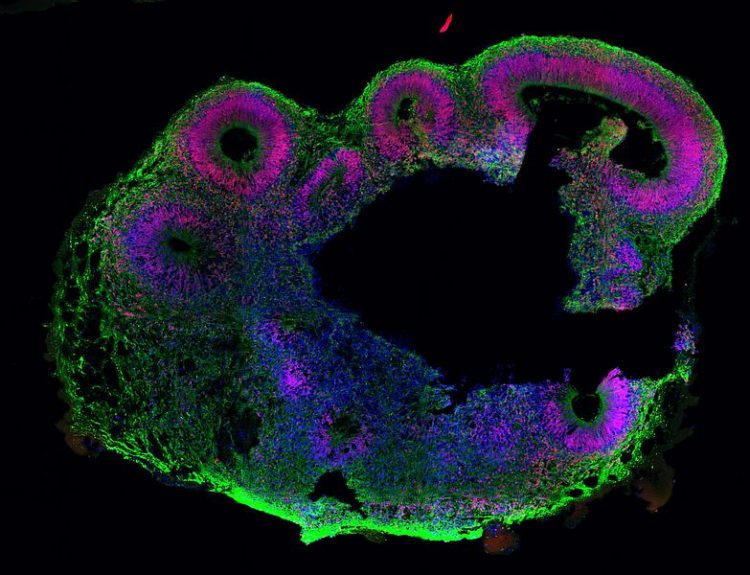Scientists initiate first ethical guidelines for organs cultivated in vitro

Ein Organoid ermöglicht erstaunliche Einblicke in die frühe Entwicklung des menschlichen Gehirns: an dem 49 Tage alten Gehirnmodell sind bereits erste Regionen der Hirnrinde angelegt.
Organ models, which are cultivated in the laboratory from human stem cells and grow into living tissue, are one of the most important scientific breakthroughs of recent years. Scientists, patients and the wider public have high hopes for this emerging field of research, as so-called “organoids” have a huge potential in terms of research and modern medicine.
In-vitro organ models allow complex organ development studies and pathogenetic analyses to be carried out directly in human tissue. New substances and therapies can be tested on human material much more quickly using this technology.
Regenerative medical practice could conceivably cultivate the required tissue in the laboratory from the cells of a patient and, lessen dependency on organ donations. The use of organoids could also significantly reduce the need for animal experiments, although biologists believe these cannot be completely eliminated in the foreseeable future.
Organoids – high hopes and bioethical dilemmas
From an ethical perspective, this new technology raises a whole range of issues. These include important caveats in relation to the use of human embryonic stem cells or the application of gene therapies to prevent or treat diseases. Jürgen Knoblich believes that “the development of organoids is unexplored scientific territory. As a researcher, I am fascinated by the huge potential of this technology.
However, I also believe it’s my job to actively promote dialogue around responsible research and to engage the wider public in the discussion”. In 2013, the stem cell specialist made scientific headlines worldwide with his laboratory-cultivated brain models.
In the latest policy statement issued in collaboration with the immunologist and geneticist Hans Clevers and the bioethicist and Member of the Dutch Parliament, Annelien Bredenoord, the researchers also examined for the first time the most important ethical dimensions of organoid research. According to Knoblich, “we hope that our work has created a solid foundation for the establishment of framework conditions for responsible engagement with this new technology”.
Weitere Informationen:
Press pictures
http://de.imba.oeaw.ac.at/index.php?id=516
Media Contact
More Information:
http://www.imba.oeaw.ac.atAll latest news from the category: Life Sciences and Chemistry
Articles and reports from the Life Sciences and chemistry area deal with applied and basic research into modern biology, chemistry and human medicine.
Valuable information can be found on a range of life sciences fields including bacteriology, biochemistry, bionics, bioinformatics, biophysics, biotechnology, genetics, geobotany, human biology, marine biology, microbiology, molecular biology, cellular biology, zoology, bioinorganic chemistry, microchemistry and environmental chemistry.
Newest articles

Superradiant atoms could push the boundaries of how precisely time can be measured
Superradiant atoms can help us measure time more precisely than ever. In a new study, researchers from the University of Copenhagen present a new method for measuring the time interval,…

Ion thermoelectric conversion devices for near room temperature
The electrode sheet of the thermoelectric device consists of ionic hydrogel, which is sandwiched between the electrodes to form, and the Prussian blue on the electrode undergoes a redox reaction…

Zap Energy achieves 37-million-degree temperatures in a compact device
New publication reports record electron temperatures for a small-scale, sheared-flow-stabilized Z-pinch fusion device. In the nine decades since humans first produced fusion reactions, only a few fusion technologies have demonstrated…





















